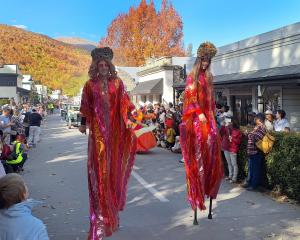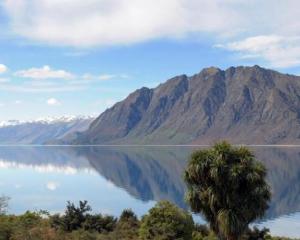And they are for sale.
The Queenstown Lakes District Council's land in what is known as the Lynch Block, named after the family who owned the land when it was originally leased to cabin owners, must be vacated by 2015.
The cabins originally were privately owned, but after the council purchased the land and negotiated an agreement with many of the cabin owners to buy them out, a lot have been on-sold, including the 10 offered for sale by auction last Saturday by the council.
QLDC Mayor Clive Geddes said the comprehensive redevelopment plan for the land, initiated after much debate in the 1990s and into the early 2000s, meant the cabins had been on a limited tenure.
But residents of the crib-style cabin community, set high above the western slopes of Queenstown with spectacular views of Lake Wakatipu, hope the economic recession may bring a reprieve.
Long-time cabin resident Gisele Laven, who has lived in her 1959 cabin since 2002, said she was sad the cabins were destined to go.
She bought her cabin fully aware they were on a limited lease, but lamented the loss of what she said was a unique community, the like of which was unlikely to be repeated, especially in Queenstown.
She said the cabins represented the simple dreams of the ordinary person who came to holiday in Queenstown after World War 2, when many of the cabins were built.
"That's what my uncle wanted to do. He served in Egypt and my aunt said: 'What is it you would most like to do in the world?' after he came home, and he said 'Get a crib in Queenstown', so that's what they did."
While many of the original cabin owners had sold or moved on, another community had made the cabins their home and, come 2015, many would have nowhere to go, Ms Laven said.
Before then, she predicted many of the owners would be forced out by the rising council fee which had increased $1000 to $3800 this year.
While some short-stay and new tenants had caused problems for the cabin community, with noisy parties, there was also a tight-knit group of long-stayers who formed part of a committed group of people living quietly in the neighbourhood, she said.
"We have a musician in one and an artist in another."
Others attracted migrant workers who were prepared share the small cabins for cheap rent.
While the proximity of cabins, many of which were just metres from each other, was not a problem for her, winter cold was, Ms Laven said.
Because the cabins were largely built for summer use, they had no insulation and poor heating.
She said it was ironic the council was talking so much about promoting low-cost and affordable housing when the cabins provided just that, and were destined to go.
"It's the only low-cost housing in Queenstown, as far as I know, and they want to close that loophole."
Long-term resident Dee Rangi said the cabins were "perfect workers' accommodation".
She had bought her cabin and has lived in the Lynch Block for five or six years because it was close to town and affordable "or if you have to take a taxi, it's only $5".
She was philosophical about the future of the cabins and had not planned that far ahead for her family.
"I'm hoping they [the council] might change their minds. It works pretty well."
Long-term resident Bronwyn Hartley's husband Darryl had rented their cabin from the Wellington owner for 12 years and the couple loved its proximity to work and the centre of town.
Mrs Hartley has a small vegetable garden, growing plants such as silverbeet and herbs in pots to compensate for the lack of space.
However, it was cold in the winter, she said.
"We don't get sun for six weeks. It's definitely one of the drawbacks. But in the summer it's lovely and sunny."
But council did not share that view, Queenstown Lakes Mayor Clive Geddes said.
The cabins would still go in 2015 to make way for a partnership development to "realise and relocate" the capital of what was now very valuable land.
Changing times meant the money was more useful elsewhere and to subsidise other council projects, he said.
Many of the cabins were not habitable or suitable as low-cost accommodation, he added.
The cabin community was not what council was backing as "affordable" accommodation through the affordable housing trust, but the displacement of communities in low-cost housing such as the cabins, was a concern for the district council was very mindful of, he added.












